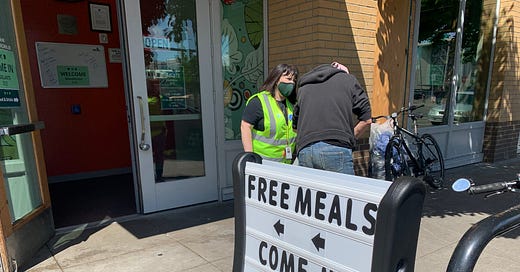Women Experiencing Homelessness in Portland are Fighting to Survive
Executive Director, Scott Kerman, of Blanchet House in Old Town, calls for sympathy in our policies to support women experiencing homelessness.
Just after breakfast service ended at Blanchet House, a woman who frequents our free cafe appeared in the window completely naked and talking to herself. She was in profound mental distress, which we’ve learned is typical for her. It’s gut-wrenching to witness. Her vulnerability laid so bare.
This is not a unique sight in Portland. Our peer social service agencies across town frequently serve women in extreme physical and emotional crises.
According to the 2019 Multnomah Point in Time Count, there are fewer houseless women than men in Oregon. But in our experience serving people living homeless, women exhibit more severe and demonstrative public psychosis and agitation. Some of this display may be performative, a learned defense to ward off people who might harm them.
The women we serve are in survival mode. They tell us that they are often attacked day and night, victims of physical and sexual assault and exploitation. Some have told us they use meth to stay awake at night, too scared to fall asleep. And sleep deprivation intensifies mental illness symptoms and mental health.
Trauma led many women to experience homelessness in Old Town, Portland, and they are retraumatized each day they spend on the street. It is horrific and heartbreaking to witness.
At Blanchet House, women and those who identify as women can often be the most challenging to serve. We see high levels of dissociative, delusional, hallucinatory, or catatonic behavior. They can be quicker to lash out at staff and volunteers both verbally and physically.
We understand that an aggressive response is due to experienced trauma and could be essential to survival.
It is a moral failing of our society that these women have come to live in inhumane conditions, fighting for survival and suffering. It's unacceptable that we are not doing better for our vulnerable community members.
To better help, Blanchet House hired peer support mentors with lived experience of homelessness, addiction, and mental illness. We sought Multnomah County funding for an innovative partnership with colleague agencies to share peer support staff. The program is now underway and already creating successful outcomes for women.
But this is just the beginning. We cannot accept a fate for women in crisis to be left to survive on the street until they don’t. It’s not enough that they are placed on 24-hour holds in psychiatric hospitals only to be released to the street, worse off because they’ve lost their belongings and bearings.
It’s well known that childhood trauma, domestic violence, sexual abuse, exploitation, and mental illness are primary causes of chronic homelessness for women. Pay and housing inequality, reproductive inequality, and gender discrimination also cause many women to be housing insecure.
We won’t solve homelessness without addressing these social ills.
All of the houseless people we serve deserve support, compassion, and dignity. But for this moment, I ask that you consider what more we can do collectively to support women and those who identify as women.
Blanchet House provides free meals and transitional housing services in Old Town, Portland. More information about ways to support Blanchet House or volunteer at https://blanchethouse.org.





